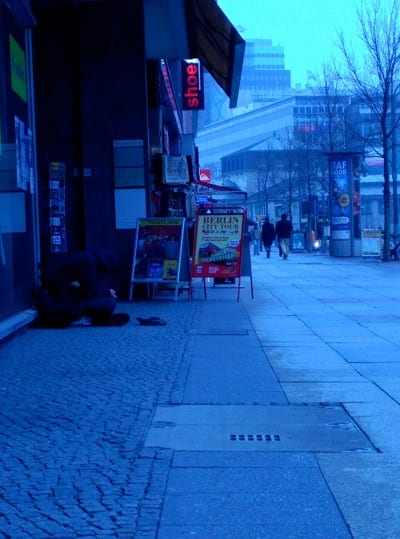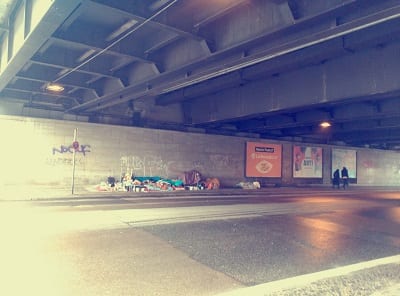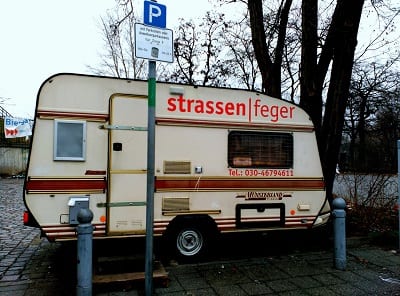It had not been such a heavy winter in Berlin but what struck me was the sleeping bags I kept seeing everywhere -in underpasses, under bridges and in the entrances of stores- while I was heading for work.
A man named Richard lives under the train bridge, under which I am passing by bike every morning and nowadays it makes him happier to get a cup of hot coffee than a donation. Since it is impossible to sleep well at this cold weather he pulls his sleeping bag to cover even his entire head and snoozes with the hope that time passes faster.
Later he moves to his spot in front of a bakery, where he positions himself well in the pedestrian traffic in order to get some alms. Having worked as a school teacher he is interested in literature and reads the novels he received from others until it gets dark.
Like many other homeless in Berlin he also has alcohol issues. There are different reasons why people end up being homeless. These vary from unemployment, debt, divorce, escaping from domestic violence, physical or mental illness to the increasing rents due to housing shortage.
And yet every homeless person has his own life story to tell.
Although Germany has a well-developed social system, some people fell through the social net and have to sleep on the streets or in a park, because of the lack of accommodation. Some spend the night at the ATM section of a bank to escape the cold and it is quite common to see them opening the door for customers who come to withdraw money.

Unlike smaller cities a big city like Berlin has various support programs including the Kältehilfe, which is unique in Germany. Kältehilfe does not just offer accommodation but circles the city with a small bus called “Kältebus” and looks after the homeless who have to live outside during winter. At times they simply hand out hot tea or sleeping bags, but when needed, they also take those who are not able to go on their own anymore to an emergency shelter. Everyone, including the passers-by can reach out the bus in order to prevent people from freezing in the cold.
The exact number of the homeless people is still unknown, as Germany, unlike many other European countries does not have the related statistical data to this phenomena. However, a support organization for the homeless has approximate numbers. According to this estimate, roughly 335.000 people had no homes in 2014, among which around 39.000 people live entirely on the streets. In addition, the number of homeless people is expected to be increasing. The number of people coming from various European countries with the hope of a better life and jobs and the insufficiency of housing opportunities also lead to the increase in the number of homeless people.
[caption id="attachment_1416" align="aligncenter" width="400"]

Sleeping area under the bridge [/caption]
[caption id="attachment_1416" align="aligncenter" width="400"]

A homeless person sleeping in the underpass[/caption]
Some homeless people try to improve their conditions while receiving support from a care home. Some of these people sell newspapers like “Motz” and “Straßenfeger” in subways with the hope of some contribution from the passengers.
[caption id="attachment_1416" align="aligncenter" width="400"]

Where sellers can pick up the newspaper Straßenfeger[/caption]
They receive 90 cents of the 1.50 Euro per a sold newspaper. The remaining 60 cents are put to use in the support program. The content of the newspapers is not all related to the conditions of the homeless but with the little dialogue that comes through this purchase you slowly get an insight to the life in Berlin as a homeless person.
During winter social inequalities become more and more visible on the streets but at the same time it also is the time to be more considerate and emphatic for others.
 Unlike smaller cities a big city like Berlin has various support programs including the Kältehilfe, which is unique in Germany. Kältehilfe does not just offer accommodation but circles the city with a small bus called “Kältebus” and looks after the homeless who have to live outside during winter. At times they simply hand out hot tea or sleeping bags, but when needed, they also take those who are not able to go on their own anymore to an emergency shelter. Everyone, including the passers-by can reach out the bus in order to prevent people from freezing in the cold.
The exact number of the homeless people is still unknown, as Germany, unlike many other European countries does not have the related statistical data to this phenomena. However, a support organization for the homeless has approximate numbers. According to this estimate, roughly 335.000 people had no homes in 2014, among which around 39.000 people live entirely on the streets. In addition, the number of homeless people is expected to be increasing. The number of people coming from various European countries with the hope of a better life and jobs and the insufficiency of housing opportunities also lead to the increase in the number of homeless people.
[caption id="attachment_1416" align="aligncenter" width="400"]
Unlike smaller cities a big city like Berlin has various support programs including the Kältehilfe, which is unique in Germany. Kältehilfe does not just offer accommodation but circles the city with a small bus called “Kältebus” and looks after the homeless who have to live outside during winter. At times they simply hand out hot tea or sleeping bags, but when needed, they also take those who are not able to go on their own anymore to an emergency shelter. Everyone, including the passers-by can reach out the bus in order to prevent people from freezing in the cold.
The exact number of the homeless people is still unknown, as Germany, unlike many other European countries does not have the related statistical data to this phenomena. However, a support organization for the homeless has approximate numbers. According to this estimate, roughly 335.000 people had no homes in 2014, among which around 39.000 people live entirely on the streets. In addition, the number of homeless people is expected to be increasing. The number of people coming from various European countries with the hope of a better life and jobs and the insufficiency of housing opportunities also lead to the increase in the number of homeless people.
[caption id="attachment_1416" align="aligncenter" width="400"] Sleeping area under the bridge [/caption]
[caption id="attachment_1416" align="aligncenter" width="400"]
Sleeping area under the bridge [/caption]
[caption id="attachment_1416" align="aligncenter" width="400"] A homeless person sleeping in the underpass[/caption]
Some homeless people try to improve their conditions while receiving support from a care home. Some of these people sell newspapers like “Motz” and “Straßenfeger” in subways with the hope of some contribution from the passengers.
[caption id="attachment_1416" align="aligncenter" width="400"]
A homeless person sleeping in the underpass[/caption]
Some homeless people try to improve their conditions while receiving support from a care home. Some of these people sell newspapers like “Motz” and “Straßenfeger” in subways with the hope of some contribution from the passengers.
[caption id="attachment_1416" align="aligncenter" width="400"] Where sellers can pick up the newspaper Straßenfeger[/caption]
They receive 90 cents of the 1.50 Euro per a sold newspaper. The remaining 60 cents are put to use in the support program. The content of the newspapers is not all related to the conditions of the homeless but with the little dialogue that comes through this purchase you slowly get an insight to the life in Berlin as a homeless person.
During winter social inequalities become more and more visible on the streets but at the same time it also is the time to be more considerate and emphatic for others.
Where sellers can pick up the newspaper Straßenfeger[/caption]
They receive 90 cents of the 1.50 Euro per a sold newspaper. The remaining 60 cents are put to use in the support program. The content of the newspapers is not all related to the conditions of the homeless but with the little dialogue that comes through this purchase you slowly get an insight to the life in Berlin as a homeless person.
During winter social inequalities become more and more visible on the streets but at the same time it also is the time to be more considerate and emphatic for others.




















































